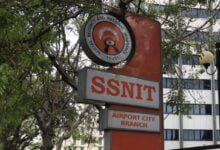Bright Simons Reacts To Reported Bank Losses In Ghana

The Vice President of Imani Africa, Bright Simons, has reacted to Bloomberg‘s report on losses incurred by some Banks in Ghana due to the Domestic Debt Exchange Programme (DDEP).
In a series of tweets, he delved into the history of banks in the country in terms of such hurdles.
Bloomberg on Tuesday reported that Ghana’s move to restructure its local currency and overseas debt has resulted in the first loss on record for two of the West African nation’s top banks.
It said GCB Bank Plc, the country’s largest lender by assets, posted a 593.4 million cedis ($50.5 million) net loss for the year to end-December, its first since 1993 when Bloomberg started maintaining data.
Meanwhile, it said, Standard Chartered Bank Ghana Ltd., the biggest by market value, reported a loss of 297.8 million cedis.
It also reported that GCB Bank took a charge of 1.83 billion cedis after impairing its debt securities, while for Standard Chartered Bank Ghana the amount was 173 million cedis.
Reacting to GBC’s losses, Simmons said, insensitivity to the news is favouring the bank at this time as deposits keep increasing.
“The health of Ghana’s banking sector on my mind as the country’s largest bank by branches, GCB, posts dramatic losses for 2022. 568 million GHS. Negative cash flows from investment activities nearly hit a billion GHS. Etc. Luckily deposits are surging due to news insensitivity. “
He further recollected such incidents in the past that affected the banks in the country.
“All this got me musing about banking history in Ghana. The recent cleanup is of cos just the latest. In 1989, 41% of all bank loans went bad. Govt stepped in & issued bonds to buy the bad loans. NPART was set up to recover. By 1991, the recovery rate was an impressive 72%.
“More recent banking interventions have seen poor results. In 1997, the Founder of A-Life Supermarkets (now CEO of First Allied) hatched a scheme where he deposited cheques in Accra issued on accounts in the regions. Lack of networking led allowed him to cash 129bn cedis. Even though the accounts on which the cheques were drawn didn’t have the money.
“In the end, less than 20% was recovered from ALife. When govts changed the state forgot to pursue. The banking cleanup of 2018/2019 looks set to record less than 10% recovery. Diminishing returns.”
1/
The health of Ghana's banking sector on my mind as the country's largest bank by branches, GCB, posts dramatic losses for 2022. 568 million GHS. Negative cash flows from investment activities nearly hit a billion GHS. Etc. Luckily deposits are surging due to news insensitivity pic.twitter.com/NX4bUcvr9M— Bright Simons (@BBSimons) April 26, 2023








